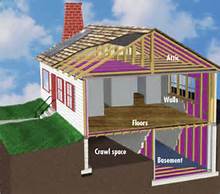
10 Aug Home Insulation
Insulation in your home provides resistance to heat flow and is very important to having a comfortable, healthy home. Besides keeping your home warm in the winter and cool in the summer, insulation can help lower your energy bills, prevent mold growth and also keep unwanted noise out. Insulation also helps keep outdoor air from getting inside your home and conditioned indoor air from escaping. This is achieved by trapping pockets of air and slowing down the in and out process.
Heat will flow from warmer to cooler areas until there is no longer a temperature difference. In your home, this means that in winter, heat flows directly from all heated living spaces to adjacent unheated attics, garages, basements, and even to the outdoors. During summer, heat flows from the outdoors to the interior of a house.
Some signs of Insulation Problems
In the winter: walls cold to touch, cold floors, high heating costs, uneven heating levels within the building and mold growth on walls.
In the summer: uncomfortably hot air inside, high cooling costs, ineffective air conditioner system and mold growth in basement.
To maintain comfort, the heat lost in the winter must be replaced by your heating system and the heat gained in the summer must be removed by your cooling system. Properly insulating your home will decrease this heat flow by providing an effective resistance to the flow of heat.
To choose the best insulation for your home from the many types of insulation on the market, you will need to know where the insulation needs to be installed and what R-value you want the installation to achieve. The R-value refers to the thermal resistance of the insulating material and depends on the type of insulation, its thickness, and its density. The higher the value, the greater the insulating effectiveness. Installing more insulation in your home increases the R-value and the resistance to heat flow.
To determine how much insulation you need for your climate, consult a local insulation contractor. Some insulation strategies require professional installation, while others, homeowners can easily handle themselves.





No Comments